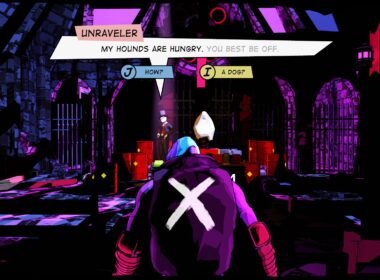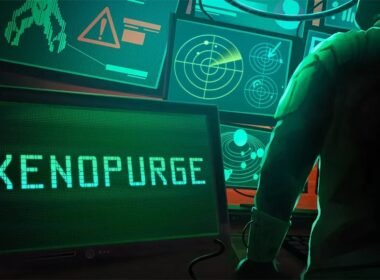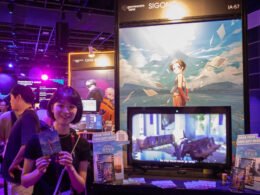Image via Anime News Network
After a 2-year gap due to the COVID-19 pandemic, Anime Expo (AX) returned to the Los Angeles Convention Center from July 1st to July 4th this year. AX boasted a jam-packed schedule featuring highly anticipated industry panels, such as Jujutsu Kaisen With the Staff on Day 3. As with any popular panel at AX, lines started to form a few hours before the panel, and it was fully capped one hour before it began.
The panel featured Studio MAPPA CEO Manabu Otsuka, Jujutsu Kaisen scriptwriter Hiroshi Seko, and TOHO producer Hiroaki Matsutani. During the introduction, Otsuka expressed his excitement to be at the panel as it was his first time going abroad in a while. Seko, who is the scriptwriter and series composition head for Jujutsu Kaisen, said “I’m very nervous as it’s my first time at a panel in front of such a big group of people, but I’m very glad to be able to meet everyone.” Matsutani, who is known as the producer of Jujutsu Kaisen and Dr. STONE, also expressed his excitement to meet the fans.


Could you explain a little about how you all work together on Jujutsu Kaisen?
Otsuka: I work closely with the scriptwriter and producer, Seko-san and Matsutani-san, and discuss what kind of anime we as MAPPA are aiming to create.
Seko: I work on the script and consider how to adapt the existing manga into an anime.
Matsutani: I work with the production team to move the project forward, both on the business and creative sides. If we need to make any adjustments, we work closely with Shueisha and MAPPA in a collaborative effort.
(Question addressed to Otsuka) As the CEO, you are of course involved in various titles at MAPPA. What impression did you have of Jujutsu Kaisen in particular?
Otsuka: Before the coronavirus pandemic, I participated in a lot of events overseas, and I felt the strong influence of Weekly Shōnen Jump series on international fans. We’ve never worked on a Jump series before Jujutsu Kaisen, so when the opportunity to animate this series came to us from Matsutani-san, we gladly accepted the challenge to take on this project.
(Question addressed to Seko) How do you adapt a manga into an anime series?
Seko: In manga, the art and text are presented on the page to convey the story. When you’re converting it into an anime, you have to consider the entire experience – it’s not just the art and text but also the music and the video experience. We also have to think about how to adapt the words and dialogue. For example, we consider how the reader responds to certain words when they read the manga. Sometimes we may keep them as-is, but other times we may present them in a different way that’s easier to understand in the anime.
(Question addressed to Matsutani) What does it mean to be a producer?
Matsutani: Something we consider in production is how do we make [the series] real for the fans and how do we take the fans’ reactions into consideration. We also consider it from a marketing perspective – how do we create an anime that can be marketed well? We think about it from a business sense and a creative sense. We act as a bridge between the original creator of the series, Gege Akutami-sensei, and the fans. If we can do that successfully, I think we have a good product.
When Jujutsu Kaisen was in production, did you expect it to become so popular globally?
Otsuka: We were well aware of the popularity of the manga before the anime was produced, so we did have some expectations. Before this series, we saw the incredible international success of Demon Slayer: Kimetsu no Yaiba, so we knew we had a potential hit on our hands with Jujutsu Kaisen. Though we had some level of expectation, we weren’t specifically aiming for a big hit, so the fact that it’s become so popular is amazing.
Seko: My answer is the same as Otsuka-san. When we saw the success of Demon Slayer, we felt like we had a good chance with Jujutsu Kaisen and that it wouldn’t fail. Although we had a hunch that it would be popular abroad, we were surprised by how much the series is loved by fans globally and it makes me really happy.
Although director Sunghoo Park couldn’t join the panel in person, he left a video message for the fans and thanked their support for the series and the Jujutsu Kaisen 0 movie. Todo is apparently a popular character in the US, so Director Park ended the video by saying “We’re all brothers!”, drawing laughs and cheers from the crowd.
Fans at the panel were given a treat with special montage videos of highlights from the series and the movie. Waves of cheers broke out every time a popular character appeared (which was almost every five seconds!). The videos left fans ecstatic with the promise of Season 2 to come soon.
The panel then showed a few key scenes and asked the staff for their commentary. The first scene was Yuji and Nobara’s two-on-two battle against the cursed womb brothers in Episode 25, in which they emerged victorious.
Otsuka: The first thing we considered when selecting these scenes was the inclusion of music and action. Those elements were the most important parts of the scene. This was one of the final battles in Season 1 so we wanted to close out the season with the best action and best music to leave a strong impact.
Seko: This scene is cool, isn’t it? Even though I only wrote the script, to see the scene turn out so well from the collaborative effort of the director and animators is quite moving.
Matsutani: The manga places a heavy emphasis on monologues such as Yuji’s, so we as a team had to consider how much of the monologue we wanted to include in the anime while still being able to convey the story.
The second scene was the beginning of Yuta and Getou’s battle in the Jujutsu Kaisen 0 movie, where Yuta reveals his determination to kill Getou to protect his friends.
Otsuka: As I said earlier, we wanted to put together the music and action in a way that was truly effective, and we wanted to raise this to a higher level when we’re talking about the movie. I’m thankful that we’re able to produce this. In addition, Ogata-san’s voice acting here [as Okkotsu Yuta] was incredible.
Seko: This scene was actually not in the original script, but we included this in the movie.
Matsutani: Director Park wanted to make an impressive climax for the movie and have an impact, thus Okkotsu’s one strong hit on Getou here. To add to what Seko-san said, if you look closely, Getou actually guarded without receiving a hit directly. You may notice these details if you pay close attention.
Were you surprised by the international box office reception of the movie?
Otsuka: Yes, I was surprised. Not only was it a hit in Japan, but the box office numbers overseas were also very impressive.
Seko: When a movie is released in the US, they gather the box office numbers from the opening weekend. I was surprised to see those numbers for this movie. It was amazing to think that this many people watched it. Thank you all very much. We worked closely with our overseas team to get an idea of what the reactions might be, and we were pleasantly surprised because it encourages us to do better. Ah, and I was reminded of how popular Todo is abroad! Though Todo is popular within Japan as well, characters like Gojo-sensei are still the frontrunner, but it seems like Todo’s popularity is on a similar level to Gojo internationally!
Did the reactions of fans outside of Japan influence your production of season 2?
Otsuka: It’s not necessarily the reactions of fans having an influence, but because of its popularity, we were able to continue with the production of the anime for a movie and a second season. For the first season, we were answering to the expectations of the manga fans, but for the second season, we’re also responding to the expectations of the audience of the first season, so we’re currently putting great care and effort into the production of season 2.
Seko: Whether it’s for fans within Japan or abroad, we just want to make an interesting series. For the second season, we’re aiming to have more flashy action scenes so please look forward to it.
Matsutani: We want to keep the excitement of the series going and continue to respond to the requests of the fans. With the second season, we will do our best to continue the momentum of the first season and the movie.
Is there anything you can share with us, or what can fans look forward to in the next season of Jujutsu Kaisen?
Otsuka: There’s so much I would like to share with you but I’m not sure how much I can. Unfortunately, I can’t share too many details but I can tell you that our staff are working really hard on some exciting material so we hope you’ll look forward to it.
Do you have any messages for the fans?
Otsuka: It’s been a long time since I was able to visit the US. I’m very thankful to be here. I would love to be able to come back again next year.
Seko: It’s my first time attending a panel of this size and I’m very thankful for your warm reception. For season 2, we’re working on some incredible things so please look forward to it.
Matsutani: I’m truly thankful to be able to meet you all here today. Gege Akutami-sensei has created a fantastic series. For us to be able to adapt that into an anime and share that with you all is a joy for us. I also want to thank Otsuka-san, Seko-san, the director Park-san, the staff at Shueisha, the animation producer, and many others who worked on this series with their passion and hard work. We will keep on doing our best, and we sincerely appreciate your continued support. Thank you very much.
Lastly, who is your favourite character from the series?
Otsuka: [looking pained and conflicted] Can you even choose? I think… Nanami.
Seko: For me, it’s Megumi Fushiguro.
Matsutani: I’ve never really thought about it, but…Toge.
The panel closed out with cheers and applause for the staff, as fans eagerly awaited the next season of Jujutsu Kaisen to come in 2023.












